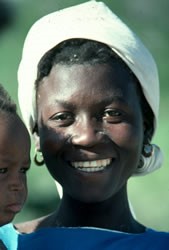Haitian in Dominican Republic

Photo Source:
Masters View / Howard Erickson
|
Send Joshua Project a map of this people group.
|
| People Name: | Haitian |
| Country: | Dominican Republic |
| 10/40 Window: | No |
| Population: | 604,000 |
| World Population: | 13,602,700 |
| Primary Language: | Haitian Creole |
| Primary Religion: | Christianity |
| Christian Adherents: | 95.00 % |
| Evangelicals: | 16.00 % |
| Scripture: | Complete Bible |
| Ministry Resources: | Yes |
| Jesus Film: | Yes |
| Audio Recordings: | Yes |
| People Cluster: | Afro-Caribbean, Francophone |
| Affinity Bloc: | Latin-Caribbean Americans |
| Progress Level: |
|
Introduction / History
Haitians are almost entirely descended from African slaves, who were brought to Haiti by European colonizers. Their job was to harvest sugar, coffee, and timber. Then, in the 1790s, former slaves Toussaint L'Ouverture and Jean-Jacques Dessalines rebelled against France. They won their independence from France in 1804.
However, since its independence, centuries of economic, political, and social difficulties have put Haitians in severe poverty. A century of paying reparations to France (amounting to $22 billion in today's money) prevented Haiti from developing its infrastructure and society. It is now the poorest country in the Western Hemisphere, with 80% of Haitians in poverty and 60% unemployed, and the number may continue to rise.
About 40% of Haitians live in the country, but due to lower prices in food imports, an increasing number are moving to urban areas. Many are even emigrating, sometimes illegally, to other countries like Canada, the U.S. and the Dominican Republic and other Caribbean nations. Their largest diaspora is the Dominican Republic, on the same island.
What Are Their Lives Like?
Some Haitians in the Dominican Republic work on farms. Outside of farming, casual jobs and self-employment are more common than steady wage jobs.
Illegal Haitian immigration to the Dominican Republic has been a problem since the early 1800s. In recent years, the Dominicans have destroyed illegal Haitian settlements on their territory, but desperate Haitians keep coming. Pregnant Haitian women have been deported either before or soon after giving birth. Some Haitians have tried to appear to be Dominicans so they can avoid communal violence and deportation.
What Are Their Beliefs?
Some Haitians practice voodoo. Others are Christians in name only who believe that tradition is the way to salvation. More than half of the population identifies itself as Roman Catholic, with 1/4 being Protestant. Older Protestant denominations like Methodists, Episcopalians, and Presbyterians were established in the 1800s, while Baptists, Mormons, and Seventh-day Adventists came from 1915-1934 when the U.S. occupied the country. Western culture has been an influence on the country, causing some Haitians to replace faith with secularism.
What Are Their Needs?
Poverty has been a major scourge for Haitians, not only in Haiti but everywhere else they live. They need better education so they can rise above farm work and other low-paying jobs.
Prayer Points
Pray for the Lord to raise up servant leaders in Haiti who can lead them out of poverty.
Pray for them to get training that will lead Haitians into high-paying jobs.
Pray for a Holy Spirit-empowered revival that will purify their churches and thrust them out as a mission force to the spiritually lost.
Pray for Haitian disciples who will make more disciples who will bring light to their dark circumstances.